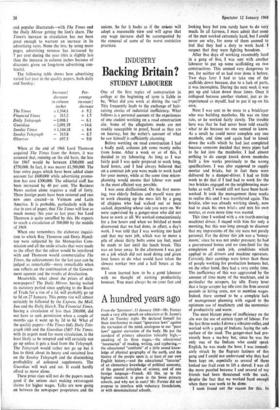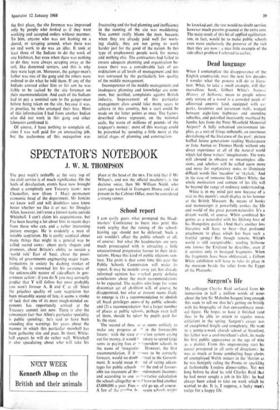Backing Britain?
INDUSTRY STUDENT LABOURER
One of the first topics of conversation in college at the beginning of term is liable to be, 'What did you work at during the vac?' This frequently leads to the exchange of hair- raising stories of industrial inefficiency. What follows is a personal account of the experiences of one student working on a road construction site. Some of the allegations made are not readily susceptible to proof, based as they are on hearsay, but the writer's account of what he saw himself is sufficiently alarming.
Before working on road construction I had a badly paid, arduous job some twenty miles from home. After a weel or sq of this, I decided to try labouring. As long as I was fairly paid I was quite prepared to work long, hard hours, and I had always believed that on a contract job you were made to work hard for your money, while at the same time micro- planning would ensure that labour was used in the most efficient way possible.
I was soon disillusioned. On the first morn- ing, two elderly Indians and myself were put to work cleaning up the mess left by a gang of chippies who had walked out or been sacked, depending whose side you were on. We were supervised by a ganger-man who did not have to work at all. We worked conscientiously for a few hours and when we finished at noon discovered that we had done, in effect, a day's work. I was told that I was working too hard and that my next job, which was to move a pile of about thirty bolts some ten feet, must be made to last until the lunch -break. This was an hour away. In the afternoon I was put on a job which did not need doing and given four hours to do what would have taken the slowest worker two and a half hours at the most.
I soon learned how to be a good labourer with no thought of earning productivity bonuses. You must always be on your feet and looking busy but you rarely have to do very much. In all fairness, I must admit that some of the men worked extremely hard, but I could never see why, for none of them seemed to feel that they had a duty to work hard. i suspect that they were fighting boredom.
After five days of working reasonably hard in a gang of five, I was sent with another labourer to put up some scaffolding on two constructions. This seemed very dangerous to me, for neither of us had ever done it before. Two days later I had to take one of the scaffolds down because, due to a lack of parts, it was incomplete. During the next week it was put up and taken down three times. Once it collapsed because another student, just as in- experienced as myself, had to put it up on his own.
Next I was sent to be mate to a bricklayer who was building Manholes. He was on time rate, so he worked fairly slowly. The trouble here was that he had never been told exactly - what to do because no one seemed to know. As a result he could never complete any one manhole, and time and again had to knock' down the walls which he had just completed because someone decided that more pipes had to be led into the manholes; I had almost nothing to do except knock down manholes built a few weeks previously to the wrong specifications. I was also supposed to supply mortar and bricks, but in fact these were delivered by a dumper-driver. I had so little" work to do that if I had had to work for the two brickies engaged on the neighbouring man- holes as well, I would still not have been hard, worked. It took the management three weeks to realise this and I was transferred again. The brickie, who was already working slowly, now had to stack his own bricks and mix his own mortar, so even more time was wasted.
This time I worked with a JCB (earth-moving machine) driver. I stayed with him for only I morning, but this was long enough to discover that my impressions of the site were not purely personal. For the driver this job was a 'honey- moon,' since he was not under pressure; he had a guaranteeed bonus and no time-limit for the completion of each job, conditions which applied to all drivers and machine operators. Certainly their earnings were lower than those of people working for production bonuses but, on the other hand, they had a very cushy time. The inefficiency of this was aggravated by the amount of time many of the machines, and in particular the scrapers, lay idle. Every hour that a large scraper lay idle cost the firm several pounds in hiring costs, not to mention wages. Indeed, there seemed to be a complete lack of management planning with regard to the optimum use of machinery and the economics of productivity and waste.
The most blatant piece of inefficiency on the site was the use of certain types of labour. For the last three weeks I drove a vibrator-roller, and worked with a gang of Indians, laying the sub- surface of the road. The ganger-man had pre- viously been a tea-boy but, since he was the only one of the Indians who could speak English, he was made the boss. I was immedi- ately struck by the flagrant laziness of this gang and I could not understand why they had been kept on, especially as several of them looked too frail even to lift a shovel. I was all the more puzzled because I and several of my friends had been threatened with the sack, despite the fact that we worked hard enough when there was work to be done.
I soon found out the reason for this. In
the first place, the site foreman was impressed only by people- who looked as if they were working and accepted orders without murmur. To him, anyone who was not leaning on a shovel, or scraping around, when there was no real work to do was an idler. It took at least three of the Indians to do the work of one Irishman, but even when there was nothing to do they were always scraping away at the soil, like demented terriers, and this is why they were kept on. Moreover, the ganger-man's father was one of the gang and the others were ordered to do what he told them. If any of the Indians crossed either him or his son he was liable to be sacked by the site foreman on their recommendation. And each of the Indians had to pay a nominal sum to the ganger-man before being taken on the site, because it was, in practice, he who arranged their hire. Most of this information I had from another Indian who did not work in this gang and other labourers confirmed it.
Of course, I have nothing to complain of, since I was well paid for an unexacting job, but the uselessness of this occupation was
frustrating and the bad planning and inefficiency in the running of the site was maddening. You cannot really blame the men, because, when they are already paid well for work- ing slackly, they are not going to work harder just for the good of the nation. In this type of employment people work for money and nothing else. The contractors had failed to ensure adequate planning and organisation be- cause there was a considerable lack of co- ordination at all levels of management and this was worsened by the particularly low quality of the middle management.
Incompetence of the middle management and inadequate planning and knowledge are com- mon, but justified, complaints against British industry. Improvement of this particular management class 'could take many years to achieve id this country, but a start could be made on the latter points at once. The factors described above represent, on the national scale, the waste of millions of pounds of the taxpayer's money : most of this wastage could be prevented by spending a little more at the initial stages of planning and construction.































 Previous page
Previous page